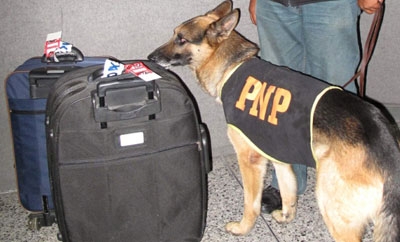Authorities in Peru are investigating three police agents thought to have facilitated cocaine trafficking through the country’s principal airport, showing drug ties persist among airport officials despite a recent purge.
According to Peru 21, a police commander and two deputy officials are under investigation for allegedly delivering a suitcase with 7.8 kilos of cocaine inside to a Portuguese national at Lima’s Jorge Chavez international airport on May 28. An additional 40 airport police were relieved of their duties for suspected involvement in the case, reported El Comercio.
Anti-narcotics agents told El Comercio there were at least five “mafias” with ties to Mexican cartels competing for control of cocaine trafficking through the airport and that the groups pay police up to $20,000 to facilitate shipments by getting cocaine-filled suitcases into the hands of drug “mules” — the couriers. The payments to mules, meanwhile, may range from around $5,000 to $15,000, according to El Comercio.
The three police agents in the current case could face charges of disobedience and failure to fulfill their duties and, if found guilty, could face up to six years in prison.
InSight Crime Analysis
The current case comes just over a month after Peruvian authorities fired an entire customs police team at Jorge Chavez over a similar scandal in which three officers were found to be moving drugs for Mexican traffickers. A year earlier, 10 airport police were accused of running a Mexico City-bound cocaine trafficking scheme. The fact that arrests continue suggests the authorities’ actions have done little to deter airport police from cashing in on the lucrative trade.
The Jorge Chavez airport — where Peru installed a pilot anti-drug task force last year — is an important departure point for drug shipments from Peru, with 131 drug mules detected there in the first eight months of 2013. In the first four months of 2014, officials seized 236 kilos of cocaine there and detained 65 mules of various nationalities.
SEE ALSO: Peru News and Profiles
However, as these cases highlight, this method is not generally used to move major loads. Much of the cocaine produced in Peru is transported first to Bolivia or Ecuador before leaving the continent, while large transcontinental shipments leaving directly from Peru are commonly shipped out from Pacific ports.
Instead, the networks running trafficking through the airport likely divide small shipments among numerous couriers. Despite the risks of detection, the method is relatively cheap and secure, since the drugs pass through few hands and are moved directly to their final destination. By corrupting police officers, the groups further improve their odds.

